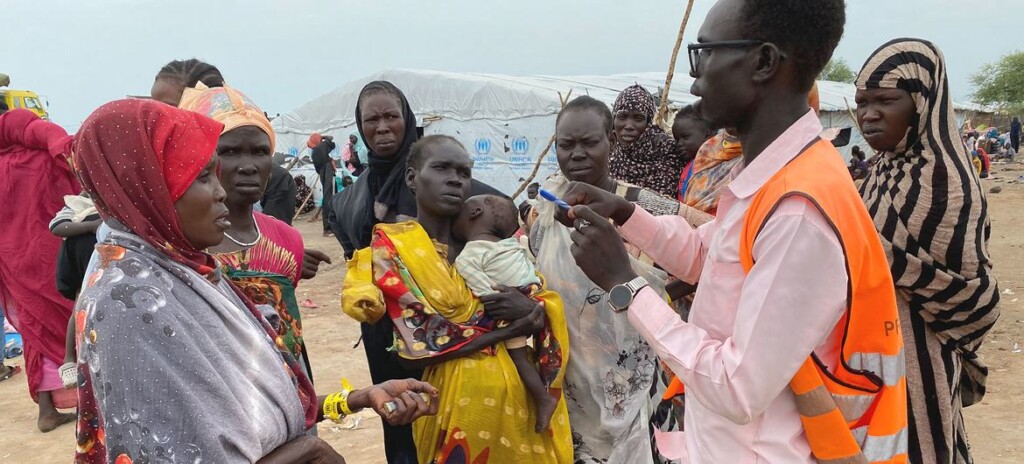Sudanese refugees face dire hardship in South Sudan camps

Displaced Sudanese arrive in Renk, South Sudan (Photo: UNOCHA / Iramaku Vundru Wilfred)
Sudanese refugees in the Gorom camp, west of Juba, capital of South Sudan, suffer from deteriorating conditions and great difficulties in the camp. An activist told Dabanga on Friday that the camp lacks even the most basic of services. She says that the people in the camp are struggling to obtain food. “Aid organisations spend $8 per month per person, but as everything is very expensive here, this is only enough for one meal a day.”
“There are also people who have been registered, and some of them received cards already but they are still waiting for aid,” the activist, who asked Dabanga not to publish her name, added.
Those with chronic health conditions face great suffering as health services are almost non-existent. The medical centre at the camp is meant to serve 2,000 people, while the camp now houses more than 18,000 refugees.
“It needs to be expanded, and have more specialist doctors. However, the centre only employs general practitioners. There is only one laboratory doctor for these large numbers.”
The activist explained that some patients are transferred to Juba Hospital, but they face difficulties in receiving treatment as they cannot pay for it.
With regards to education, there are no basic schools and only one secondary school in the neighbourhood but, so far, Sudanese students have not been accepted there.
The source lauded the support of the government of South Sudan for the Sudanese refugees. “The government stands with the refugees, but does not have the capabilities or resources to provide services and assistance to them.”
IOM
According to the Displacement Tracking Matrix of the International Organization for Migration (IOM), 542,199 people fled the more than 10-month-old war in Sudan to South Sudan by February 4. About one-fifth of them are Sudanese, 80 per cent are non-Sudanese nationals, mostly South Sudanese refugees who now forcibly returned.
The Youth for Darfur Organisation Mashad last week warned of a humanitarian catastrophe that threatens the lives of thousands of Sudanese refugees in South Sudan. More than 4,000 people suffer from a severe shortage of basic needs, the organisation stated on X on Thursday.
“The silence of many international humanitarian organisations regarding the provision of relief poses a serious danger to Sudanese refugees in South Sudan, which may lead to worsening living conditions in the camps that already suffer from a lack of food and medicine.”
The suffering of about 4,000 refugees in the Yida camp in South Sudan’s Unity state designated for refugees from the Nuba Mountains in South and West Kordofan continues for the fifth year, as a result of the cessation of services provided to them since 2019, after the United Nations Refugee agency (UNHCR) transferred its activities to the Pamir and Ajuong Thok camps, about 30 kilometres southeast of Yida.
Refugees in Yida camp told Dabanga last week that they suffer greatly in obtaining basic services, especially healthcare, in addition to a shortage of drinking water.
One of the refugees explained that they have become dependent on services provided by the government of South Sudan to the local community in the Ida region. These are already stretched providing for the local community, let alone refugees alike. They pointed out that they obtained drinking water from old wells that the organisations left behind before moving their activities.
As for food, he said that they depend on the agricultural products that they produce on small farms in the autumn, and they do not meet their nutritional needs.
Regarding the educational conditions, the refugee reported that there are eight elementary schools and two secondary schools in the camp. “Education in Yida camp depends on the refugees’ own efforts. Several families in the camp cannot pay educational expenses, which forces many children to stay at home.”
UNHCR in South Sudan suspended its work in Yida camp in 2019 for security reasons. UNHCR staff is only present in Yida to receive and register refugees coming from the Nuba Mountains and then deporting them to the Ajuong Thok and Pamir camps.











 and then
and then